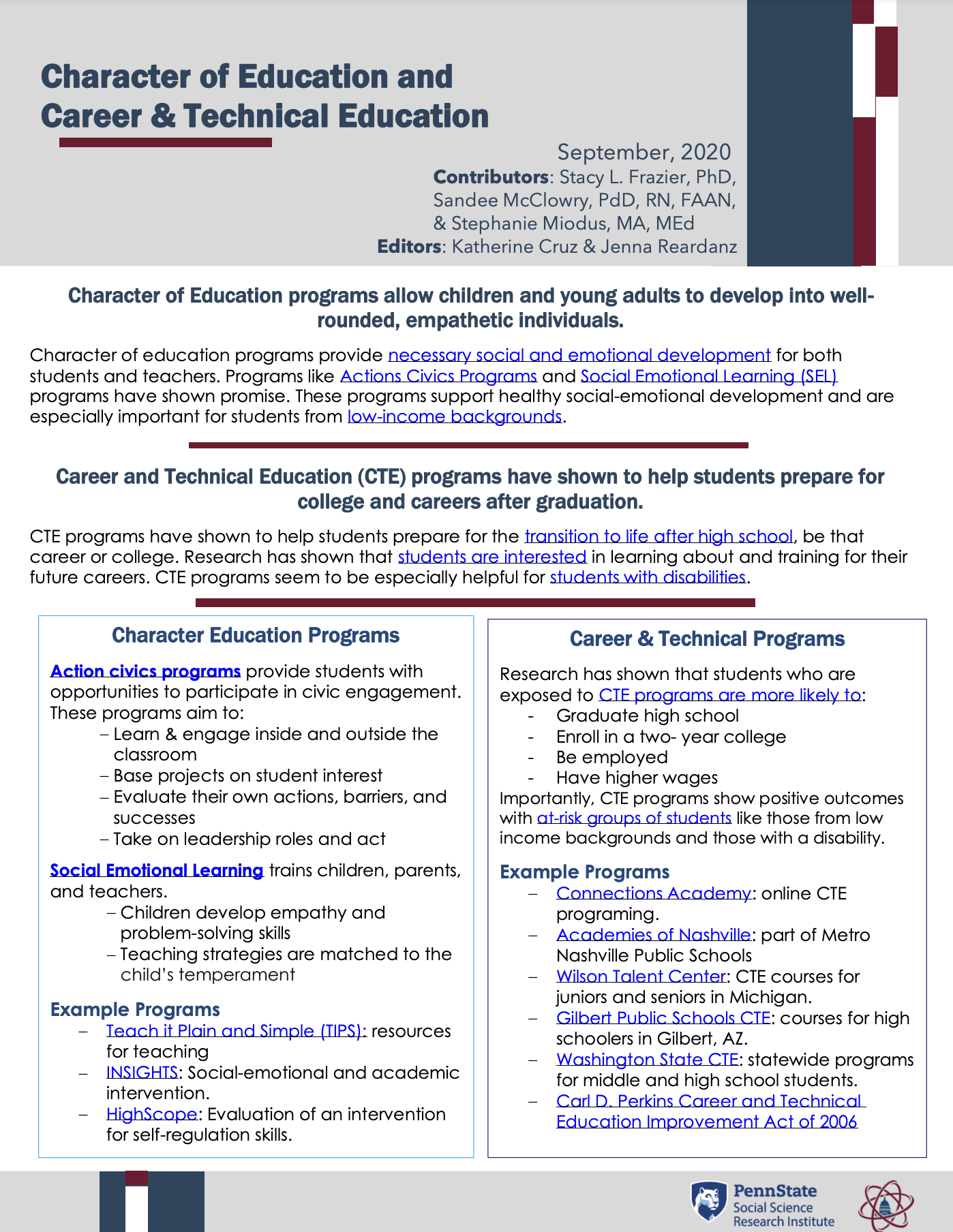
Character of Education Programs Allow Children and Young Adults to Develop Into Well-rounded, Empathetic Individuals.
Character of education programs provide necessary social and emotional development for both students and teachers. Programs like Actions Civics Programs and Social Emotional Learning (SEL) programs have shown promise. These programs support healthy social-emotional development and are especially important for students from low-income backgrounds.
Career and Technical Education (CTE) Programs have Shown to Help Students Prepare for College and Careers After Graduation.
CTE programs have shown to help students prepare for the transition to life after high school, be that career or college. Research has shown that students are interested in learning about and training for their future careers. CTE programs seem to be especially helpful for students with disabilities.
Character Education Programs
Action civics programs provide students with opportunities to participate in civic engagement. These programs aim to:
- Learn & engage inside and outside the classroom
- Base projects on student interest
- Evaluate their own actions, barriers, and successes
- Take on leadership roles and act
Social Emotional Learning trains children, parents, and teachers.
- Children develop empathy and problem-solving skills
- Teaching strategies are matched to the child’s temperament
Example Programs
- Teach it Plain and Simple (TIPS): resources for teaching
- INSIGHTS into Children’s Temperament: Social-emotional and academic intervention.
- HighScope: Evaluation of an intervention for self-regulation skills.
Career & Technical Programs
Research has shown that students who are exposed to CTE programs are more likely to:
- Graduate high school
- Enroll in a two- year college
- Be employed
- Have higher wages
Importantly, CTE programs show positive outcomes with at-risk groups of students like those from low income backgrounds and those with a disability.
Example Programs
- Connections Academy: online CTE programing.
- Academies of Nashville: part of Metro Nashville Public Schools
- Wilson Talent Center: CTE courses for juniors and seniors in Michigan.
- Gilbert Public Schools CTE: courses for high schoolers in Gilbert, AZ.
- Washington State CTE: statewide programs for middle and high school students.
- Carl D. Perkins Career and Technical Education Improvement Act of 2006
The Research-to-Policy Collaboration (RPC) works to bring together research professionals and public officials to support evidence-based policy. Please visit their website to learn more.
Key Information
RPC Website
Research-to-Policy Collaboration
Publication DateSeptember 1, 2020
Topic Area(s)Education and Child Development, Economy and Entrepreneurship
Resource TypeWritten Briefs
Share This Page
Character of Education Programs Allow Children and Young Adults to Develop Into Well-rounded, Empathetic Individuals.
Character of education programs provide necessary social and emotional development for both students and teachers. Programs like Actions Civics Programs and Social Emotional Learning (SEL) programs have shown promise. These programs support healthy social-emotional development and are especially important for students from low-income backgrounds.
Career and Technical Education (CTE) Programs have Shown to Help Students Prepare for College and Careers After Graduation.
CTE programs have shown to help students prepare for the transition to life after high school, be that career or college. Research has shown that students are interested in learning about and training for their future careers. CTE programs seem to be especially helpful for students with disabilities.
Character Education Programs
Action civics programs provide students with opportunities to participate in civic engagement. These programs aim to:
- Learn & engage inside and outside the classroom
- Base projects on student interest
- Evaluate their own actions, barriers, and successes
- Take on leadership roles and act
Social Emotional Learning trains children, parents, and teachers.
- Children develop empathy and problem-solving skills
- Teaching strategies are matched to the child’s temperament
Example Programs
- Teach it Plain and Simple (TIPS): resources for teaching
- INSIGHTS into Children’s Temperament: Social-emotional and academic intervention.
- HighScope: Evaluation of an intervention for self-regulation skills.
Career & Technical Programs
Research has shown that students who are exposed to CTE programs are more likely to:
- Graduate high school
- Enroll in a two- year college
- Be employed
- Have higher wages
Importantly, CTE programs show positive outcomes with at-risk groups of students like those from low income backgrounds and those with a disability.
Example Programs
- Connections Academy: online CTE programing.
- Academies of Nashville: part of Metro Nashville Public Schools
- Wilson Talent Center: CTE courses for juniors and seniors in Michigan.
- Gilbert Public Schools CTE: courses for high schoolers in Gilbert, AZ.
- Washington State CTE: statewide programs for middle and high school students.
- Carl D. Perkins Career and Technical Education Improvement Act of 2006
The Research-to-Policy Collaboration (RPC) works to bring together research professionals and public officials to support evidence-based policy. Please visit their website to learn more.

Key Information
RPC Website
Research-to-Policy Collaboration
Publication DateSeptember 1, 2020
Topic Area(s)Education and Child Development, Economy and Entrepreneurship
Resource TypeWritten Briefs
Share This Page
LET’S STAY IN TOUCH
Join the Evidence-to-Impact Mailing List
Keep up to date with the latest resources, events, and news from the EIC.




